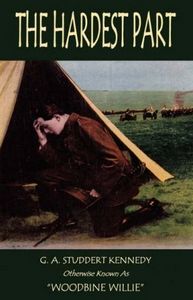Reilly 185-6. Book not in Reilly.
The Sorrows of God mun' be 'ard to bear If 'e really 'as love in ' is 'eart, And the 'ardest part i' the world to play Mun surely be God's part. "If ever there was a preacher of common-sense Christianity it is the Rev. G A Studdert Kennedy." Evening Standard "We doubt if any priest of our communion, or perhaps any communion at all, has such a gift of startling speech...He speaks in the language of the wayfaring man, taken up and fused with the eloquence of a master." Church Times "(Studdert Kennedy's writings)...are all charged with the love of man, and the love of life, with a faith which really triumphs over ugliness, squalor, and injustice, and a joyous defiance of cant." Times Literary Supplement
Geoffrey Studdert Kennedy, the seventh of nine children, was born in Leeds on 27th June, 1883. His parents were Jeanette Anketell and William Studdert Kennedy, the vicar of St Mary's Quarry Hill, Leeds. Educated at Leeds Grammar School and Trinity College, Dublin, Studdert Kennedy graduated in classics and divinity in 1904.
After a year's training at Ripon Clergy College, he became a curate in Rugby and in 1914 the vicar of St. Paul's, Worcester. On the outbreak of the First World War Studdert Kennedy volunteered to become an a chaplain to the armed forces on the Western Front. Given the nickname Woodbine Willie, for his habit of distributing cigarettes to soldiers, he was loved and respected by the men for his bravery under fire.
In 1917 Studdert Kennedy won the Military Cross at Messines Ridge after running into No-Mans-Land to provide comfort to those injured during an attack on the German frontline. He wrote several poems about his experiences and these appeared in the books, Rough Rymes of A Padre (1918) and More Rough Rhymes (1919).
In 1922 Studdert Kennedy was appointed to run St Edmund King and Martyr in Lombard Street, London. His experiences during the war had converted him to Christian Socialism and pacifism, and he wrote about his beliefs in several books including Lies (1919), Democracy and the Dog-Collar (1921), Food for the Fed Up (1921), The Wicket Gate (1923) and The Word and the Work (1925).
Studdert Kennedy also worked for the Industrial Christian Fellowship (ICF) and this involved him in public speaking tours of Britain. In 1928 a newspaper reported that his sermons were so emotional that at his packed meetings "women wept and men broke down". Geoffrey Studdert Kennedy was taken ill during an ICF crusade in Liverpool and died on 8th March, 1929.
